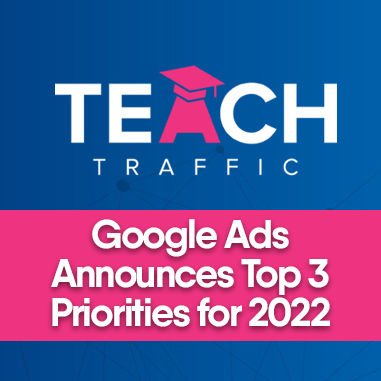Google Ads Announces Top 3 Priorities for 2022
On a recent Google Ads & Commerce blog, Google Ads announced their top three priorities for this year, which is the following: automation, measurement, and privacy. Here’s how they are tackling these topics.
Explore New Opportunities and Growth With Automation
Jerry Dischler – Vice President and General Manager of Google Ads mentioned the shift in consumer behavior presents both challenges and opportunities especially in the space of Automation.
Their conversations with brands and advertisers made them to focus on the need for readiness, speed, and agility in order to drive growth especially in uncertain times.
According to Jerry Dischler:
“Over 80% of Google advertisers are now using automated bidding to free up time and improve ad performance.”
Google is emphasizing heavily on the use of the following campaign types: Performance Max and Discovery campaigns.
Both of these campaign types focus on reaching users and potential customers at scale from a single campaign. Google pushes the benefits of Performance Max and Discovery Campaigns:
- Multi-channel reach
- Incremental conversions
- Simplified campaign management (less campaigns)
- Greater ad inventory
Google recommends that for single channel campaign types such as Search, Display, and YouTube that advertisers lean into automation with Smart Bidding, responsive search ads, and broad match keywords.
The Future Of Measurement
With iOS 14 update from last year which featured the removal of third-party cookies, measurement has been pretty challenging for most advertisers.
That said, Google announced that the future of measurement is combining consented first-party data with insights from new, privacy-safe technology, like browser APIs.
They will be also rolling out new solutions that address privacy and measurement which includes the following:
- Enhanced conversions
- Consent mode
- Conversion modeling
- Data-driven attribution
Note that these solutions will rely heavily on your first-party data and privacy-safe APIs.
These solutions and efforts from Google prioritize users by respecting their privacy, but at the same time they are also listening to advertisers’ needs to track their campaign efforts.
Consumers’ Expectations For Digital Privacy
Google understands clearly that consumers feel the need for user privacy and controls. And they assured that users’ data are safe and maintains some level of anonymity.
They have updated their privacy playbook that capture both perspective, from user and advertiser’s perspective. And here are the three main highlights of this playbook:
- Building direct relationships with customers
- Ensuring measurement remains accurate and actionable
- Keep your ads relevant
What does this mean for us advertisers?
Since we’re used to relying on paid advertising to drive all of our final sales and showing direct ROI, the role of paid advertising may need to change.
A good example is that, the goal of your non-brand or awareness campaign efforts should shift and prioritize in capturing first-party data instead of aiming for final sale.
